Short throw vs long throw vs ultra short throw projectors: what's the difference?
Our guide to projector technologies

All kinds of short throw, long throw, and ultra-short throw projectors are available to buy these days – but if you're looking for the best projector for your needs, which one of these technologies should you look for?
A trip to the cinema may be off the cards at the moment, but that doesn’t mean you have to miss out on some big-screen action. A projector can completely change your whole viewing experience and give you a screen size of up to 300 inches. And with home projector technology coming on leaps and bounds in the last few years, a projector can be surprisingly good value in comparison to some big-screen TVs.
Home projectors are light, portable and capable of offering 4K, HDR and HD images, so it’s a no brainer that you would add one to your home entertainment set up. But once you’ve decided to buy a projector, there are a lot of specifications and jargon to wade through. Do you need a short throw or ultra-short throw? An LCD or a DLP? Should you concern yourself about lumens?
Well, the good news is, this guide will help you work out which projector is the best for your home and narrow down those choices so you can find your ideal model.
Let's start by looking at the available types of projector. There are five main types of projector on the market DLP, LCD, laser, LCOS, and LED.
But when it comes to home cinema, the best and most common choices are DLP (digital light processing) and LCD (liquid crystal display); these are both lamp-based projectors, so they’re easier to maintain and cheaper than laser projectors whilst producing a comparable image quality.
DLP or LCD?
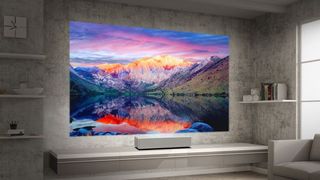
These are the two best (and cheapest) options when it comes to buying a projector for your home.
Get daily insight, inspiration and deals in your inbox
Get the hottest deals available in your inbox plus news, reviews, opinion, analysis and more from the TechRadar team.
DLP projectors use a colour wheel in conjunction with a light source and tilting mirrors to produce the projected image. They tend to be smaller and lighter and will often show more contrast than LCD options.
LCD projectors use a light source that passes through three RGB (red, green, and blue) chips, which then creates and projects the images. The images that come from an LCD projector often appear brighter than those from a DLP. And brightness matters if you have a lot of light in your room.
However, the quality of both types of projector is so good that you’re unlikely to notice much of a difference if you’re using it to screen TV and movies at home. It’s worth noting that ultra short throw projectors are predominantly laser-based, so you can expect to pay a higher price than if you opt for a short or long throw alternative.
Lumens – do they matter?
Yes. Lumens are the measure of brightness, so the higher the lumen count, the brighter the image. If you’re planning on using your projector at all times of the day, then you’re going to need a projector that has a higher lumen count, as the higher the count, the clearer the image will be regardless of the amount of ambient light.
So, if you’re planning on kicking back and watching tons of day time TV, consider a projector that has at least 2,500 lumens. If you’re more a movie and popcorn-in-the-dark kind of person, you can go lower because you’ll presumably have a dark room for the best results.
What about screens and throw ratio?
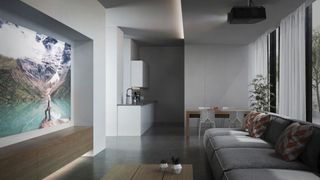
The surface on which you project your image is important. If you have a large white wall free, then you don’t have to worry about buying a screen, although any uneven surfaces will reflect the light differently, so you won’t quite get that bright, sharp image you’d expect. But if you don’t have a spare wall or want to experience the best picture your projector can muster, there are various screens on the market.
When choosing the right projector for your space, you have to consider how far back you’ll need to place the projector to get a large enough image. Throw refers to the distance between the projector and the screen and is determined by the type of lens that the projector uses to create the picture. This is where the choice of short, ultra-short and long throw projectors comes in to play.
Short throw projectors
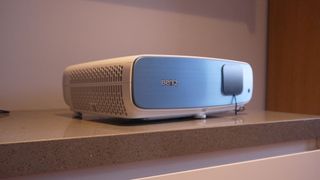
Short throw projectors create a large 100-inch plus image by being placed between three and eight feet away from the projection area. So it makes them the perfect choice for small living rooms or bedrooms as they give a large picture size without a physical large screen dominating your space. Most short throw projectors have built-in speakers, but if you’re an audio buff, you may want to spend a bit of extra time and money investing in a decent sound system.
If you’re looking for a short throw projector, then you can’t go wrong with the BenQ TK850. It's super-bright with 3,000 lumens, a very impressive amount for a projector at its very reasonable $1,699 / £1,499 (around AU$2,600) price tag with strong HDR and high-contrast gaming too. A back-lit remote helps in the dark, too.
Long throw projectors
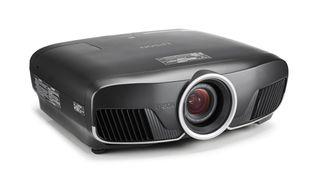
As the name may suggest, a long throw projector needs to be further away from the projection source in order to project a good image. Long throw projectors need to be at least six feet away but the further away you move it, the bigger your picture will be so if you have a large room where you want to screen your movies, a long throw projector is ideal.
The Epson EH-TW9400 is an excellent HD projector. This three-chip LCD model is competing with single-chip DLP models that require a color wheel, and thus suffer from rainbow artefacts. Because of that, this projector is capable of bright, detailed and wonderfully saturated images. There’s also a low input lag, support for HDR10 and even 3D (if that still floats your boat), making this a cracking all-rounder.
Ultra-short throw projectors
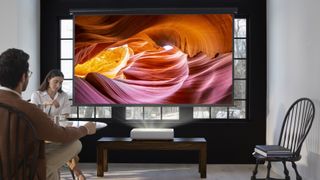
Whether you’re in a small apartment or a large mansion, an ultra-short-throw projector is perfect for every space. Ultra-short throw projectors sit close to the projection site and are a great alternative to large-screen TVs.
These projectors use wide-angle lenses and mirrors to throw the image from a short distance. Because they use laser technology, these projectors work in bright rooms, so ideal for family spaces. They use a laser or LED light which means they last a lot longer than short or long throw projectors that are lamp-based.
Samsung The Premiere ultra-short throw projector is an exceptional bit of kit for any home cinema enthusiast. It has 2,800 lumens, so it’s great for handling all kinds of ambient light. It has a powerful in-built audio system as well as a built-in tuner. It’s slightly pricey at US$6,499 / £6,999 / AU$10,999 – for the LSP9T model, at least – but it is a full TV-style smart system that will work in any setting.
If your budget won’t quite stretch to the Premiere, then you might want to consider the Vava 4K laser projector; it's exclusive to the US, but offers a sharp picture and pleasing design (almost identical to the Premiere, oddly) for about half the price of the top-end LSP9T Premiere model.
Which projector is best for you?
A projector is an excellent investment whether you’re a casual movie watcher or you love to binge on your entertainment. They make such a great alternative to big-screen televisions, and because they come in a variety of sizes, there’s a projector to suit every space. They also will last a long time, even lamp-based projectors still have an impressive usage time, and if you opt for laser, then the life of the product will extend even further.
There are other things you need to consider before you click purchase on your ideal projector. For a start, you need to think about sound. Most televisions have speakers built-in, projectors do too, but they are often not good enough for everyday use, let alone when you’re settling down to watch your favourite blockbuster. So think about what sound system you’ll use when you install your projector. It would help if you also thought about how you’re going to feed your entertainment to the projector itself. Will you use your cable box or maybe a smart streaming device? However you’re planning on watching your content, make sure that the projector you choose has the right outlets to make that happen.
What one is best for you really does depend on your space and what image quality you're happy to live with. If you want some expert opinions on the best projectors on the market right now, why not check out our best projector guide of 2021.
